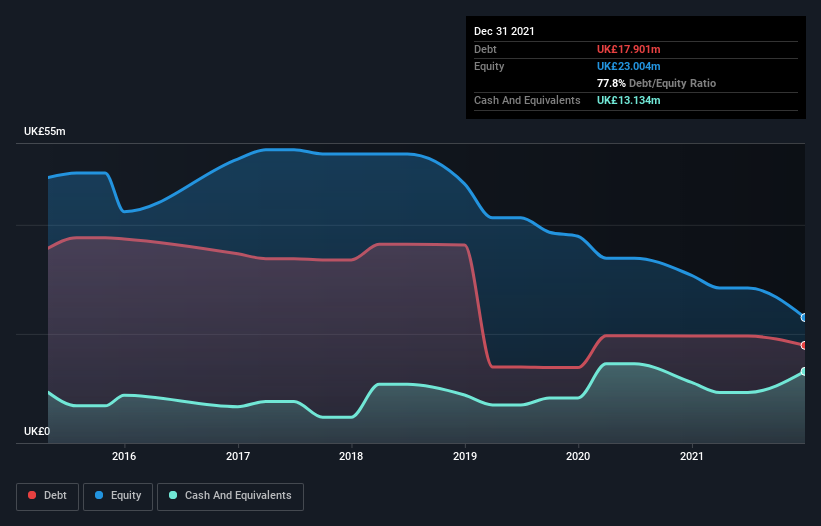Some say volatility, rather than debt, is the best way to think about risk as an investor, but Warren Buffett famously said that 'Volatility is far from synonymous with risk.' It's only natural to consider a company's balance sheet when you examine how risky it is, since debt is often involved when a business collapses. We can see that Ebiquity plc (LON:EBQ) does use debt in its business. But the real question is whether this debt is making the company risky.
Why Does Debt Bring Risk?
Generally speaking, debt only becomes a real problem when a company can't easily pay it off, either by raising capital or with its own cash flow. Ultimately, if the company can't fulfill its legal obligations to repay debt, shareholders could walk away with nothing. However, a more frequent (but still costly) occurrence is where a company must issue shares at bargain-basement prices, permanently diluting shareholders, just to shore up its balance sheet. By replacing dilution, though, debt can be an extremely good tool for businesses that need capital to invest in growth at high rates of return. When we think about a company's use of debt, we first look at cash and debt together.
See our latest analysis for Ebiquity
How Much Debt Does Ebiquity Carry?
You can click the graphic below for the historical numbers, but it shows that Ebiquity had UK£17.9m of debt in December 2021, down from UK£19.6m, one year before. However, it also had UK£13.1m in cash, and so its net debt is UK£4.77m.

How Strong Is Ebiquity's Balance Sheet?
According to the last reported balance sheet, Ebiquity had liabilities of UK£29.1m due within 12 months, and liabilities of UK£23.4m due beyond 12 months. On the other hand, it had cash of UK£13.1m and UK£22.1m worth of receivables due within a year. So it has liabilities totalling UK£17.3m more than its cash and near-term receivables, combined.
While this might seem like a lot, it is not so bad since Ebiquity has a market capitalization of UK£52.1m, and so it could probably strengthen its balance sheet by raising capital if it needed to. But it's clear that we should definitely closely examine whether it can manage its debt without dilution. When analysing debt levels, the balance sheet is the obvious place to start. But it is future earnings, more than anything, that will determine Ebiquity's ability to maintain a healthy balance sheet going forward. So if you're focused on the future you can check out this free report showing analyst profit forecasts.
In the last year Ebiquity wasn't profitable at an EBIT level, but managed to grow its revenue by 13%, to UK£63m. We usually like to see faster growth from unprofitable companies, but each to their own.
Caveat Emptor
Over the last twelve months Ebiquity produced an earnings before interest and tax (EBIT) loss. Indeed, it lost UK£5.1m at the EBIT level. Considering that alongside the liabilities mentioned above does not give us much confidence that company should be using so much debt. So we think its balance sheet is a little strained, though not beyond repair. We would feel better if it turned its trailing twelve month loss of UK£7.0m into a profit. So in short it's a really risky stock. There's no doubt that we learn most about debt from the balance sheet. However, not all investment risk resides within the balance sheet - far from it. For example Ebiquity has 2 warning signs (and 1 which makes us a bit uncomfortable) we think you should know about.
When all is said and done, sometimes its easier to focus on companies that don't even need debt. Readers can access a list of growth stocks with zero net debt 100% free, right now.
Valuation is complex, but we're here to simplify it.
Discover if Ebiquity might be undervalued or overvalued with our detailed analysis, featuring fair value estimates, potential risks, dividends, insider trades, and its financial condition.
Access Free AnalysisHave feedback on this article? Concerned about the content? Get in touch with us directly. Alternatively, email editorial-team (at) simplywallst.com.
This article by Simply Wall St is general in nature. We provide commentary based on historical data and analyst forecasts only using an unbiased methodology and our articles are not intended to be financial advice. It does not constitute a recommendation to buy or sell any stock, and does not take account of your objectives, or your financial situation. We aim to bring you long-term focused analysis driven by fundamental data. Note that our analysis may not factor in the latest price-sensitive company announcements or qualitative material. Simply Wall St has no position in any stocks mentioned.
About AIM:EBQ
Ebiquity
Provides media investment analysis services in the United Kingdom, Ireland, North America, Continental Europe, and the Asia Pacific.
Undervalued with adequate balance sheet.
Market Insights
Community Narratives




